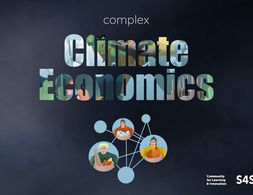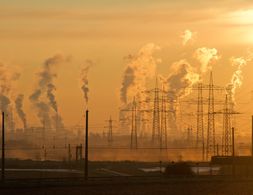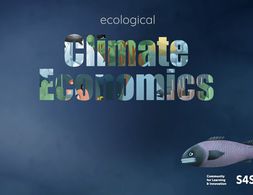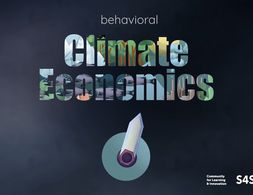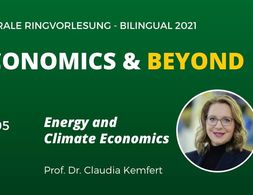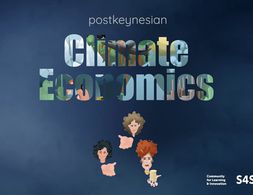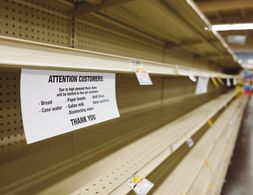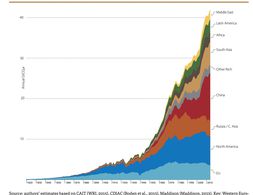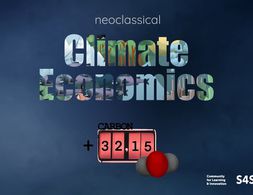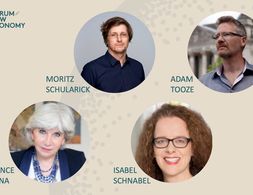914 Ergebnisse
Can pluralism in economics be useful to tackle the fight against climate change? How can a diversity in methods and ideas allow for a better understanding of the issue of the climate crisis? What solutions do different schools of thought offer to overcome the most pressing challenge of the 21st Century? Our Rethinker Henrika Meyer will give you some answers and give you a glimpse of the solutions pluralism offers to tackle the fight against climate change.
Can pluralism in economics be useful to tackle the fight against climate change? How can diversity in methods and ideas allow for a better understanding of the issue of the climate crisis? What solutions do different schools of thought offer to overcome the most pressing challenge of the 21st Century? Our Rethinker Henrika Meyer will give you some answers and give you a glimpse of the solutions pluralism offers to tackle the fight against climate change.
In this webinar for the Princeton Bendheim Center for Finance, Nobel Prize winner William Nordhaus explains the main problems regarding the economics of a low-carbon energy transition.
Here we look at the effect of the 2008 Climate Change Act passed in Parliament in the United Kingdom as an effort to curb emissions in all sectors. The Act aside from setting goals to become a low-carbon economy sets up an independent committee on Climate Change to ensure the implementation of policies to comply with the ultimate goal of 80% reduction in total emissions in 2050. I make use of the Synthetic Control Method (SCM) to create a comparative case study in which the creation of a synthetic UK serves as a counterfactual where the treatment never occurred (Cunningham, 2018).
In this blog article Steve Keen elaborates on flawed climate change modelling and mainstream economics forecasts. In specific, he stresses the climate change forecasts of the DICE model (“Dynamic Integrated model of Climate and the Economy”) by Nobel Memorial Prize in Economic Sciences winner William Nordhaus.
The book criticizes neoclassical climate economics in the tradition of William Nordhaus. It explains why this kind of thinking is misleading and why neoclassical climate economics asks the wrong questions.
An essay of the writing workshop on contemporary issues in the field of Nigerian economics: The adverse effect of climate change is overwhelming, not just in Nigeria but globally. Global warming is the result of hostile human activities that have impacted the environment negatively. This is the principal variable the government should tackle through practical innovations such as the acceptable implementation of Adaptation Policies and also through the adequate implementation of environmental tax. These will enhance pro-environmental behaviour which is fit for socio-political and economic activities for sustainability.
This text summarizes the content of the 2018 Nobel Prize winner W. Nordhaus. It is extended by some critical perspectives on this topic. The short dossier gives an overview of the most important texts we have read in the climate economics reading group.
Can pluralism in economics be useful to tackle the fight against climate change? How can diversity in methods and ideas allow for a better understanding of the issue of the climate crisis? What solutions do different schools of thought offer to overcome the most pressing challenge of the 21st Century?
Can pluralism in economics be useful to tackle the fight against climate change? How can diversity in methods and ideas allow for a better understanding of the issue of the climate crisis?
The climate crisis is not primarily a problem of ‘believing science’ or individual ‘carbon footprints’ – it is a class problem rooted in who owns, controls and profits from material production. As such, it will take a class struggle to solve. In this ground breaking class analysis, Matthew T. Huber argues that the carbon-intensive capitalist class must be confronted for producing climate change.
This video explains what the term 'Feminist Economics' describes and goes into detail on how feminist economists use methodology differently, why they advocate for diversity in research and how to look into preconditions for the functioning of our economies. It, additionally, highlights the link between feminist economics and the study of climate change.
Is our system capable of energy transition and climate protection? How plural is economic policy in practice and who makes the big decisions? What kind of change do we want?
This video provides a brief introduction to post-keynesian economics and how the school of thought would tackle climate change.
Dani Rodrik, Professor of International Political Economy at Harvard's Kennedy School of Government, is teaching in this online session about the global rules under which the modern (free trade-focused) type of globalization operates and why, under such institutions, international community fails to deal with the climate change and pandemics.
The British historian, Adam Tooze, highlights how the climate crisis is not just an environmental or ecological problem but also a political economy challenge.
Neoclassical Economics imposed itself over the past decades as the core of mainstream economics, largely influencing academia and policy making.
In this course you will learn the basics for developing economically viable climate resilient plans The course starts with a review of the scientific consensus on changes in climate patterns and projections to the future and explains the rationale for countries to develop climate resilient plans that will help them …
Recovery from the Covid-19 crisis provides a chance to implement economic measures that are also beneficial from environmental and social perspectives. While ‘green’ recovery packages are crucial to support economies tracking a low-carbon transition in the short-term, green measures such as carbon pricing are also key to improving welfare in the long-term. This commentary specifies the need for carbon pricing, outlines its implications for our everyday lives, and explains how it works alongside value-based change in the context of climate action and societal well-being.
There was a time when the world still seemed a good and above all simple place for monetary authorities Every few weeks they had to decide whether in view of the latest price developments it would be better to raise the key interest rates by a quarter point or not …
Central banks have once again proven to be the first line of defense in crisis-ridden times. With their far reaching actions they prevented the world from experiencing a collapse of financial markets on top of the severe health and economic crisis caused by Covid-19.
Environmental catastrophe looms large over politics: from the young person’s climate march to Alexandria Ocasio-Cortez’s Green New Deal, increasing amounts of political space are devoted to the issue. Central to this debate is the question of whether economic growth inevitably leads to environmental issues such as depleted finite resources and increased waste, disruption of natural cycles and ecosystems, and of course climate change. Growth is the focal point of the de-growth and zero-growth movements who charge that despite efficiency gains, increased GDP always results in increased use of energy and emissions. On the other side of the debate, advocates of continued growth (largely mainstream economists) believe that technological progress and policies can ‘decouple’ growth from emissions.
The Philosophy of Economics Foundational Text provides a systematic and well-structured overview over the field of philosophy of economics.
The Routledge Handbook of Feminist Economics presents a comprehensive overview of the contributions of feminist economics to the discipline of economics and beyond. Each chapter situates the topic within the history of the field, reflects upon current debates, and looks forward to identify cutting-edge research. Consistent with feminist economics' goal of strong objectivity, this Handbook compiles contributions from different traditions in feminist economics (including but not limited to Marxian political economy, institutionalist economics, ecological economics and neoclassical economics) and from different disciplines (such as economics, philosophy and political science). The Handbook delineates the social provisioning methodology and highlights its insights for the development of feminist economics. The contributors are a diverse mix of established and rising scholars of feminist economics from around the globe who skilfully frame the current state and future direction of feminist economic scholarship. This carefully crafted volume will be an essential resource for researchers and instructors of feminist economics.
In this 5 weeks online course, the Global Change Institute from the University of Queensland explains different types of climate change policies, the economic theory at their basis and the possible output. Starting from the fundamentals of carbon and climate change policies, and how they have been applied worldwide, the course aims to teach fundamental skills to move towards a low carbon economy.
The last 15 years have seen extensive research into ecosystem service valuation (ESV), spurred by the Millenium Ecosystem Assessment in 2005 (Baveye, Baveye & Gowdy, 2016). Ecosystem services are defined as “the benefits people obtain from ecosystems” (Millenium Ecosystem Assessment, p.V). For example, ecosystems provide the service of sequestering carbon which helps regulate the climate. Valuation means giving ecosystems or their services a monetary price, for example researchers have estimated that the carbon sequestration services of the Mediterranean Sea is between 100 and 1500 million euros per year. The idea of ESV was a response to the overuse of natural resources and degradation of ecosystems, allegedly due to their undervaluation and exclusion from the monetary economy. ESV can be used (1) for policy decision-making, for example allocating funding to a reforestation project (2) for setting payments to people who increase ecosystem services, for example a farmer increasing the organic carbon content of their soil, and (3) for determining fees for people who degrade ecosystem services, for example a company that causes deforestation.
Deforestation is estimated to be responsible for about 12-29% of global greenhouse gas emissions. This essay will explore ecological economics as an alternative lens through which to approach forest conservation and the acceleration of climate change.
Along with addressing core conceptual issues in defining heterodox economics, we will cover in some detail five heterodox traditions in economics: Marxian Economics, Institutional Economics, Post-Keynesian Economics, Feminist Economics, and Ecologi-cal Economics. In the first class meeting, we discuss the structure and goals of the course, as well as the expectations and requirements from the students. In addition, we will discuss the concept of heterodoxy in economics, along with discussing the concepts and key issues in mainstream and neoclassical economics.
Introduction Economics is by necessity a multi paradigmatic science Several theoretical structures exist side by side and each theory can never be more than a partial theory Rothschild 1999 Likening scientific work to the self coordinating invisible hand of the market Michael Polanyi cautioned strongly against centralized attempts to steer …
This paper starts with an evaluation of three common arguments against pluralism in economics: (1) the claim that economics is already pluralist, (2) the argument that if there was the need for greater plurality, it would emerge on its own, and (3) the assertion that pluralism means ‘anything goes’ and is thus unscientific. Pluralist responses to all three arguments are summarized. The third argument is identified to relate to a greater challenge for pluralism: an epistemological trade-off between diversity and consensus that suggests moving from a discussion about ‘pros’ and ‘cons’ towards a discussion about the adequate degree of plurality. We instantiate the trade-off by showing how it originates from two main challenges: the need to derive adequate quality criteria for a pluralist economics, and the necessity to propose strategies that ensure the communication across different research programs. The paper concludes with some strategies to meet these challenges.
Big challenges lie ahead for our society: increased automation of work, and the threat of catastrophic climate change. But so, too, are the huge possibilities presented by new technology and better ways of organising our economy in the wake of neoliberalism's failure.
"Energy issues have always been important in international relations, but in recent years may have become even more important than in the past due to the widespread awareness of existing limits to energy sources and negative climate impacts. The course discusses global trends in energy consumption and production, various available scenarios for potential developments in the coming decades, the availability of oil reserves and the evolution of the oil industry. It then discusses natural gas and highlights the differences between oil and gas. It will also discuss renewable energy sources, nuclear energy and EU energy policy.
The course aims at providing students whose main interest is in international relations a background on energy resources, technology and economic realities to allow them to correctly interpret the political impact of current developments. It also aims at providing students, who already have a technical background in energy science or engineering, with the broad global view of energy issues that will allow them to better understand the social, economic and political impact of their technical knowledge."
Wir nutzen Cookies. Klicke auf "Akzeptieren" um uns dabei zu helfen, Exploring Economics immer besser zu machen!


